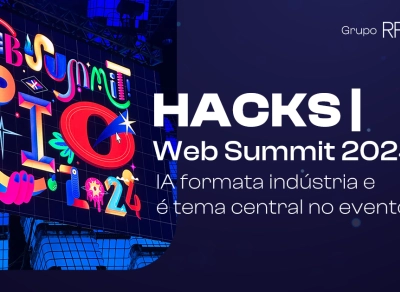And how they can impact your company’s future
More than 21,000 participants from 91 countries gathered at Web Summit Rio for three days of events, with over 170 daily sessions arranged in various formats, such as lectures, roundtable discussions, master classes, startup presentations, Q&A sessions, and investment rounds.
Similar to SXSW, Web Summit maintained its dynamic format in its first edition on Brazilian soil, which makes it impossible to have a concise and comprehensive experience; keeping up with eight hours of discussions daily requires planning and, even then, accepting that we will only have access to a tiny part of all sessions.
Web Summit content was divided into tracks to facilitate the scheduling of individual agendas. In this report, we bring the tracks followed by the RPMA team, which delved into topics that will impact how companies communicate.
Are you ready for the journey?
AI: the elephant in the room
Artificial Intelligence (AI) was the main topic of the event, and it couldn’t be different: advancements in the field have already begun to impact numerous sectors of the economy, and participants from various areas such as marketing, technology, health, education, and finance – to name a few – were eager for news. The forecast by Daniela Braga (Defined.ai), one of the 12 advisors to the National Artificial Intelligence Initiative task force, aimed at advising Joe Biden, President of the United States, set the tone of the event: “AI is the next industrial revolution.”
The instant popularization of ChatGPT, the leading name associated with generative AI, expanded the discussion of the topic beyond technologists and generated excitement around the potential threats related to the tool. In this sense, regulation emerges as an urgent measure to pave a path still under construction.
For Chelsea Manning, security consultant at Nym, today, AI is the elephant in the room. For this reason, she draws attention to the need for ethical regulation while inviting experts in the field to take responsibility for market ethics: “Unlike doctors and lawyers, who have centuries of profession and a solid ethical code, technologists have a vital role in regulating the profession and also point out the potential harms that new technologies may bring.”
Sarah Al-Hussaini, COO of Ultimate, believes that the identification of AI-generated content should be compulsory: “People need to know that there is no intimacy in a conversation, but rather a transactional relationship with a machine, otherwise we will have a distortion in the relationship with brands.”
“There will always be good and bad actors using technology, each in their way. The solution is to embrace innovation and ensure rapid and effective regulation,” emphasizes Don Muir, CEO of ARC.
Companies “powered by AI”
What are the advantages of companies adopting AI? Experts agree that high investments only make sense if there is an action plan or a specific problem to be solved in companies.
Jumping on the current hype can be fruitless if there is no solid strategy for adopting new technologies.
According to Ana Buchaim, B3’s CMO, “We invest five times more in AI than the average company because we need to be prepared for the next level, but the analysis done by people is the most important impact.”
Luiz Grecco, VP of Digital Solutions at CI&T, presents a future of possibilities enhanced by AI: “There is nothing to fear, on the contrary: there are many new fields to be explored. Using artificial intelligence to generate codes means infinite attempts to create new things. Instead of A/B tests, we can do tests from A to Z.”
According to a study by CI&T, 50% of companies already invest in artificial intelligence; shortly, it will be 90%. “About 75% of developers already use artificial intelligence to accelerate learning and help with recurring tasks. This shows that curiosity is much greater than fear.”
The company has an innovation hub with over a thousand connected people who exchange information and co-create with artificial intelligence. In addition, 150 clients invest in and already benefit from these innovations.
Sarah Al-Hussaini does not hide her excitement: “AI will change how we deal with technology, making it friendlier for people unfamiliar with it. It is important not to fear evolution or delay its adoption.”
The speed of innovation is increasing the speed of consumers’ adoption of new technologies, making them more prone to changes, even in brands. This is a warning from Nancy Villanueva, CEO of Interbrand, to companies that still hesitate to keep up with this recent evolution led by artificial intelligence: “The consumer experience is evolving much faster than companies can keep up with. They are willing to change, and brands must understand this to remain competitive.”
Future of Work
“Will ChatGPT steal my job?” You’ve thought about it, and so have many around you. It’s such a common concern that the topic has been addressed in countless conversations. Predictions are largely positive, but experts still tend towards a more apocalyptic view.
One of them is Igor Marinelli, CEO of Tractian. He believes that AI will replace repetitive and inefficient jobs, and many people will be replaced. “We know that replacement will happen, there’s no sugarcoating it, but we must ensure that at least the quality of work improves,” he challenges.
Daniela Braga (Defined.Ai) agrees with Marinelli in part: in the short term, jobs that require little qualification will indeed be replaced, but in the long term, the story changes. “While many positions will disappear, many temporary jobs will emerge to meet very specific demands. It’s a misconception that AI will steal jobs.”
Very specific demands require more qualified people. In this sense, Daniel Knopfholz, CTO of O Boticário, invites private companies to embrace the opportunity: “They have the responsibility to teach employees to rethink their careers, preparing them for the future in a situation beneficial for both sides. There will be a gap, and it is up to companies to overcome it.”
Paula Mageste (Edições Globo Condé Nast), on the panel “Will ChatGPT kill journalism?”, touches on a sensitive point, speaking on behalf of journalists and content producers, probably the ones who feel most threatened by AI: “There is a general crisis of trust in the media; journalism still needs the human factor, we go into the field, nurture relationships with sources, have our point of view, allow subjectivity. We are important to restore lost trust.”
Alex Collmer, CEO of VidMob, also believes that many new jobs can be created to perform functions not yet imagined. And for that, we all need to understand how to use AI to our advantage.
ESG: the human factor of innovation
Most of the Web Summit Rio 2023 discussions pointed towards a future of technology, data, artificial intelligence, and codes. A somewhat non-human future. But not all. The topic of “ESG” was present, as expected at any event of this magnitude, which brought together agents from various sectors of the economy. For César Sanches, from B3, the subject has evolved to the point where it has ceased to be a cost associated with philanthropy and has become an investment and a competitive differentiator.
Sergio Cisneros, LinkedIn consultant for Latam, addressed a topic that has been gaining prominence year by year: green skills. “Today, we still have a supply of professionals with green skills aligned with demand, but demand will surpass supply starting in 2024.” South America is one of the regions advancing the most on the subject, second only to the USA. And Brazil is the region’s driving force: the sixth market among the top 25.
Women were highlighted at the event, accounting for 40% of the audience and 37% of the speakers. Of the startups present, 22% were founded by women. It may seem little, but in a scenario dominated by cisgender men and whites, these numbers bring relief.
The theme of “diversity” had little prominence, but those who dared to address it were incisive. Daniela Braga (Defined.ai) drew attention precisely to the difficulty that women entrepreneurs face in the competition for investments, a goal of many present at the mega-event.
Monique Eville, angel investor at Investivos, advocated for greater diversity in the influencer/content creator scene and encouraged companies to take responsibility for this advancement: “Brands make public commitments, but invest millions in agencies that hire only white influencers. We need to question the intermediaries and ensure greater representation.”
While Monique points out the devastating effect that hate speech on social media has on young black people from the peripheries, Thais Fabris, founder of 65/10, and Carol Delgado, from Puxadinho, presented data from a survey conducted with girls from the peripheries. “Most of the world is apart from what we discuss here at this event. And peripheric girls are the most harmed. They don’t aspire to technology positions because they don’t believe they are for them. They are too close to the problems and are part of the solution,” says Thais. Carol adds: “You can’t think about building the future when so many people are starving.”
For them, the future is not in the data.





 How can we help?
How can we help?